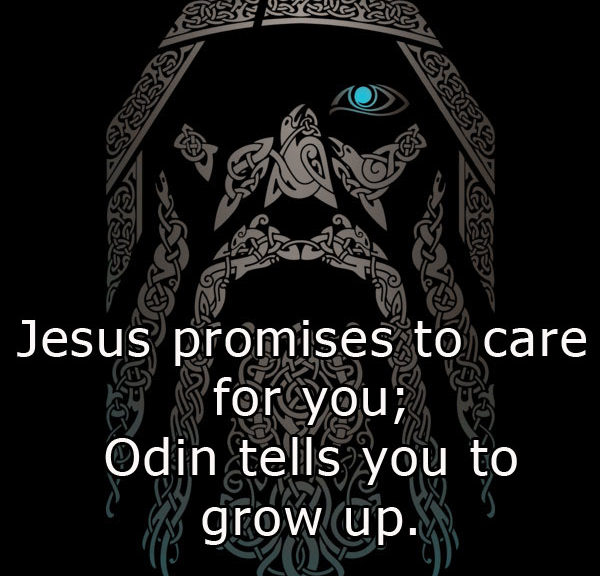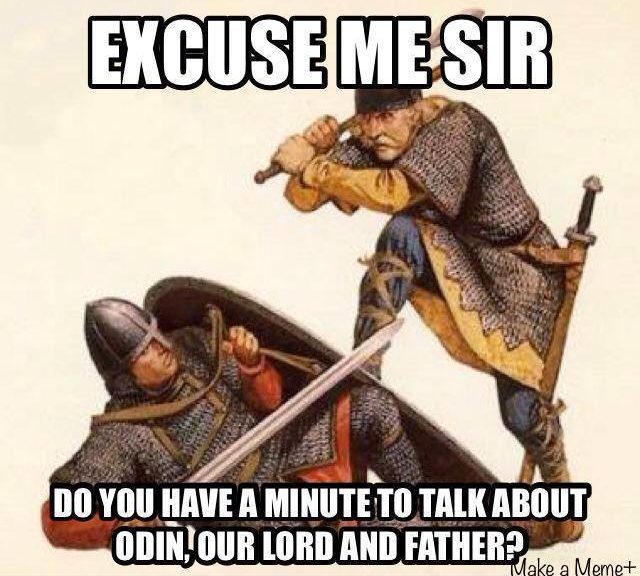Why Bad Things Happen: One Heathen’s Perspective
Bad things happen. When I look at things like the Paris attacks, I can’t help but wonder why. And as a former Christian turned Heathen, it’s easy for me to fall into the “why did god/the gods let this happen?” mode. The words, “shit happens” really does embody the Heathen and pagan view, so you’re probably going to get my rationale when it comes to this. Here is my perspective on why shit happens.
Christian God Versus Reality
You’ll see me talking about the Christian god quite a bit, because, quite frankly, as Americans, we deal with a Christian-pervasive society. While it is true that some folks have grown up without being in Christian family, I think most of us still have the Christian influences in our lives. Growing up in a Christian household, I was told to trust in god. That god had a plan. That god would take care of me. That everything would be okay.
If you’ve gone through some tough times, you know damn well that reality is never that cut and dry. That bad things happen to good people all the time and bad people do get away with things. Sometimes we see karma in action, but more often, we are left wondering how in the Hel we can pick up our lives and move on.
I can point to many instances of bad things happening to good people: children having cancer, tornadoes and hurricanes killing good people, and terrorist attacks. In many cases, the victims were Christians and perhaps very good people. The Christian god was asleep at the wheel on that day when bad things happened, otherwise, he wouldn’t have let it happen, assuming he was an all-powerful and benevolent deity.
Why the Gods Don’t Interfere — at Least Not Much
I personally believe that no god is truly all-powerful. Some are more powerful than others, which makes sense. But none of them are everywhere or paying attention to everything. My own patron god doesn’t always hang around my life because, quite frankly, it’s boring to him. Other gods may pop in and out as they will, but they aren’t with me all the time. Yep, sometimes I’m alone.
I went through some trying times and, quite frankly, got a little snotty with one of the gods for “abandoning” me. He showed up in a dream later and told me that he couldn’t prevent what happened. It was the Wyrd, and he thought it sucked too. But he did have some solace for me, which made me hesitate and think about the situation. In retrospect, he could’ve told me to fuck off and send me back to whatever I decided: Christian, Agnostic, or Atheist. But he didn’t. Instead, he sought to console me, which was surprising. At least to me.
Our Place in the Wyrd
 Basically, we’re all stuck with our Wyrd or fate. We like to think of ourselves as masters of our destiny, but even science says that free will may be an illusion. This sucks big time. The only thing that affects the universe is our choices, and depending on what we decide, our decisions spin off another universe. That’s amazing, if it doesn’t make your head hurt. We coexist in the past, present, and future, but we can’t perceive those times because of our limited, linear thinking. Or to quote the good Doctor:
Basically, we’re all stuck with our Wyrd or fate. We like to think of ourselves as masters of our destiny, but even science says that free will may be an illusion. This sucks big time. The only thing that affects the universe is our choices, and depending on what we decide, our decisions spin off another universe. That’s amazing, if it doesn’t make your head hurt. We coexist in the past, present, and future, but we can’t perceive those times because of our limited, linear thinking. Or to quote the good Doctor:
“People assume that time is a strict progression of cause to effect but actually from a non-linear, non-subjective viewpoint, it’s more like a big ball of wibbly wobbly, timey wimey stuff…”
Yeah, I just quoted Doctor Who. Get over it.
Basically, if you believe in physics and science, some things are just beyond even the gods. The Norns are possibly the only ones who handle our destinies, but even then, they just spin, measure, and cut. They don’t show us what the measure of our lives look like.
What’s more, we really don’t know what else is going on beyond our simple point of view. There may be something; there may be nothing. We just may be in the wrong place at the wrong time.
What to Take Away from All This
Bad things happen. Good things happen. Not everything that happens is something we want. Sometimes it happens for a reason. More often, it happens for no particular reason other than our choices, or no choices, or a single quantum flip. Sometimes the gods can help us; other times they can’t. That’s why in the end we have to deal with all the unfair things life throws at us, as well as all the good things. When we as Heathens understand that our destiny is due to our choices combined with quantum physics, we can finally understand the nature of the universe and the gods just a little better.






